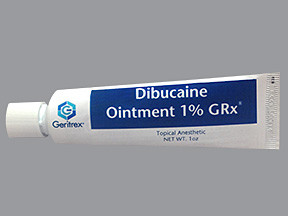DIBUCAINE - TOPICAL
PHONETIC PRONUNCIATION: (DYE-bue-kane)
GENERIC NAME(S): dibucaine
Uses
USES: This medication is used on the skin to stop itching and pain from certain skin conditions (such as scrapes, minor burns, eczema, insect bites) and to treat minor discomfort and itching caused by hemorrhoids. Dibucaine is a local anesthetic that works by causing temporary numbness/loss of feeling in the skin.
How to use DIBUCAINE - TOPICAL
HOW TO USE: If you are using the over-the-counter product to self-treat, read all directions on the product package before using this medication. If you have any questions, consult your pharmacist. If your doctor has prescribed this medication, use it as directed. Before use on the skin, clean and dry the affected area as directed. Apply a thin layer of medication to the affected area of skin as directed, usually 3 to 4 times a day. Do not use on large areas of the body or apply heat unless directed to do so by your doctor. These may increase the risk of serious side effects. Wash hands immediately after use unless you are treating an area on the hands. Avoid getting the product in eyes, nose, or ears. If the medication gets in these areas, rinse the area immediately with clean water. The dosage is based on your medical condition and response to treatment. Do not use more of this product, use it more often, or keep using it longer than directed. If there is an infection or sore in the area to be treated, do not use this medication without consulting your doctor first. If your condition lasts or gets worse, or if you think you may have a serious medical problem, get medical help right away.
Side Effects
Precautions
Interactions
Overdose
Images
Reviews
Faq for DIBUCAINE - TOPICAL
Dibucaine topical is used to relieve pain and itching caused by minor skin irritations, sunburn, insect bites, or hemorrhoids.
Dibucaine topical works by numbing the skin and temporarily relieving pain and itching sensations.
Apply a thin layer of Dibucaine topical to the affected area and gently rub it in until fully absorbed. Wash your hands after application.
Some common side effects of Dibucaine topical include redness, itching, burning, or a rash at the application site. If any severe or persistent side effects occur, consult your doctor.
No, Dibucaine topical should not be used on open wounds, broken skin, or severely damaged skin.
Dibucaine topical should not be used on children under the age of 12 without the advice of a doctor.
You can apply Dibucaine topical up to 4 times a day or as directed by your healthcare professional.
It is important to consult your doctor before using Dibucaine topical during pregnancy or breastfeeding.
Dibucaine topical is generally not known to interact with other medications. However, it is always recommended to inform your doctor or pharmacist about all the medications you are taking.
Disclaimer
IMPORTANT: HOW TO USE THIS INFORMATION: This is a summary and does NOT have all possible information about this product. This information does not assure that this product is safe, effective, or appropriate for you. This information is not individual medical advice and does not substitute for the advice of your health care professional. Always ask your health care professional for complete information about this product and your specific health needs.

No Reviews Yet